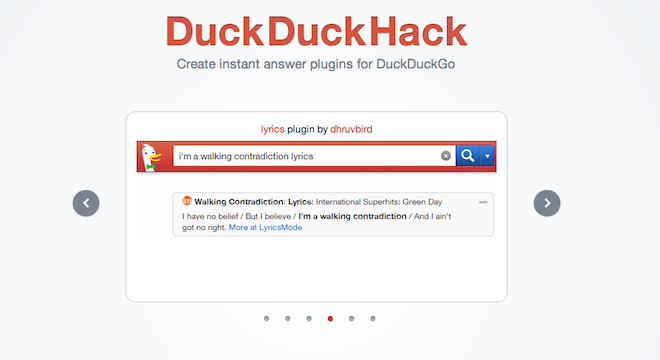The small upstart search engine known as DuckDuckGo has developed a new weapon in its quest to challenge Google’s dominance of the Web: Users.
More specifically, DuckDuckGo is turning to users who also know how to code, namely software developers, inviting them to write plug-ins for the the search engine that display “instant answers.”
Instant answers refer to information related to a search engine user’s query that is presented at the top of the search results themselves, before the links to the various other websites that may contain that information, such as real-time weather forecasts, a word’s definition, or the name of a song based on a snippet of its lyrics (pictured above).
“I think most search results would benefit by some form of instant answer,” wrote DuckDuckGo’s founder Gabriel Weinberg his personal blog on Tuesday.
So, DuckDuckGo launched a whole new Web software development platform in mid-April, the aptly named DuckDuckHack, which allows aspiring search engine coders to help improve DuckDuckGo by submitting their own ideas for instant answers and the corresponding code that allow them to run automatically on the website whenever a user searches.
Think of them as “apps” for a search engine — created by third parties but which run on a central service, in this case, DuckDuckGo. Also, they apply to all users, not just one.
The first few plug-ins that have been submitted and accepted into the search engine range tremendously in function. In some, the utility is obvious — such as an instant answer that automatically converts roman numerals to modern digits (and back) or another that automatically calculates the number of days between any two given dates. Other instant answers are more whimsical, such as one that automatically flips the text entered into the search bar after the word “flip.”
Weinberg himself seems to be a big fan of a plug-in that automatically displays the latest published strip of the hit web comic XKCD.
In many ways, the playful nature of some of the plug-ins echoes Google’s more notable search easter eggs, such as the recent Zerg Rush search minigame, except they serve a more utilitarian purpose. But as Weinberg explained to TPM via email, he thinks his approach is the best yet because it combines human intuition with search algorithms to display the most useful instant results.
“I think specific people know the best data sources in a particular area and this platform enables them to hand craft those data sources to produce the best instant answers,” Weinberg said.
DiuckDuckGo reviews and approves all of the plug-ins that go up on its website. Weinberg told TPM that the actual review process is still being defined.
“Rght now we get in the pull requests, and then work with the author(s) to get something that works well on the site,” Weinberg wrote.
To be clear, Google, Bing and Yahoo (now powered by Bing) have all offered instant answers to search queries for years, for almost a decade in the case of Google.
But those larger, more well-known search engines haven’t turned to the crowd to the extent that DuckDuckGo has with its new effort. Weinberg told TPM he is unaware of anything like DuckDuckHack.
“I don’t know of anything this ambitious in terms of wanting to make 100s or even 1000s of plugins live on the main search engine,” Weinberg said.
Weinberg told TPM that his small team was working as fast as they could to review and approve new plugins as well as expand the submission categories (there are four currently). His team is also testing a new “news” search results box that appears at the top of the search results page on DuckDuckGo to show relevant new information on a news story without taking away space from important historical data in the rest of the search results below.
DuckDuckGo hopes to chip away at Google’s dominance over the search market by offering users what it says are improved privacy features and non-personalized search results. The company has seen astronomical growth over the early part of 2012, now up to over 1.5 million unique daily searches, which is still a drop in the bucket compared to Google’s 1 billion unique daily searches.









